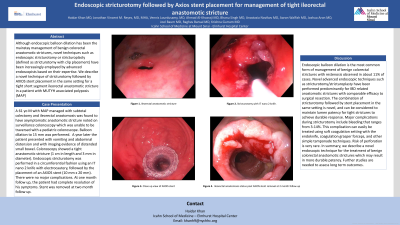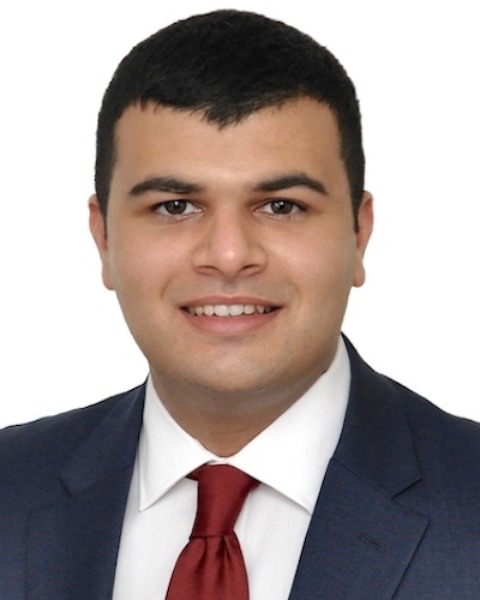Back


Poster Session A - Sunday Afternoon
Category: Interventional Endoscopy
A0437 - Endoscopic Stricturotomy Followed by Axios Stent Placement for Management of Tight Ileorectal Anastomotic Stricture
Sunday, October 23, 2022
5:00 PM – 7:00 PM ET
Location: Crown Ballroom

Has Audio

Haidar Khan, MD
Icahn School of Medicine at Mount Sinai, NYC Health + Hospitals/Elmhurst
Elmhurst, NY
Presenting Author(s)
Haidar Khan, MD1, Jonathan Vincent M. Reyes, MD2, Vennis Lourdusamy, MD1, Ahmed Al-Khazraji, MD1, Bhanu Singh, MD1, Anastasia Novikov, MD1, Aaron Walfish, MD1, Joshua Aron, MD1, Joel Baum, MD1, Raghav Bansal, MD1, Krishna Gurram, MD1
1Icahn School of Medicine at Mount Sinai, NYC Health + Hospitals/Elmhurst, Elmhurst, NY; 2Icahn School of Medicine at Mount Sinai - NYC Health + Hospitals/Elmhurst, Elmhurst, NY
Introduction: Although endoscopic balloon dilation has been the mainstay management of benign colorectal anastomotic strictures, novel techniques such as endoscopic stricturotomy or stricturoplasty (defined as stricturotomy with clip placement) have been increasingly employed by advanced endoscopists based on their expertise. We describe a novel technique of stricturotomy followed by AXIOS stent placement in the same setting for a tight short segment ileorectal anastomotic stricture in a patient with MUTYH associated polyposis (MAP).
Case Description/Methods: A 61 yo M with MAP managed with subtotal colectomy and ileorectal anastomosis was found to have asymptomatic anastomotic stricture noted on surveillance colonoscopy which was unable to be traversed with a pediatric colonoscope. Balloon dilation to 15 mm was performed. A year later the patient presented with vomiting and abdominal distension and with imaging evidence of distended small bowel. Colonoscopy showed a tight anastomotic stricture (1 cm in length and 3 mm in diameter). Endoscopic stricturotomy was performed in a circumferential fashion using an IT nano 2 knife with electrocautery, followed by the placement of an AXIOS stent (10 mm x 20 mm). There were no major complications. At one month follow up, the patient had complete resolution of his symptoms and is planned for stent removal.
Discussion: Endoscopic balloon dilation is the most common form of management of benign colorectal strictures with restenosis observed in about 11% of cases. Novel advanced endoscopic techniques such as stricturotomy or stricturoplasty have been performed predominantly for IBD related anastomotic strictures with comparable efficacy to surgical resection. The combination of stricturotomy followed by stent placement in the same setting is novel, and can be considered to maintain lumen patency for tight strictures to achieve durable response. Major complications during stricturotomy include bleeding that ranges from 3-14%. This complication can easily be treated using soft coagulation setting with the endoknife, coagulation grasper forceps, and other simple tamponade techniques. Risk of perforation is very rare. In summary, we describe a novel endoscopic technique for the treatment of benign colorectal anastomotic strictures which may result in more durable patency. Further studies are needed to assess long term outcomes.

Disclosures:
Haidar Khan, MD1, Jonathan Vincent M. Reyes, MD2, Vennis Lourdusamy, MD1, Ahmed Al-Khazraji, MD1, Bhanu Singh, MD1, Anastasia Novikov, MD1, Aaron Walfish, MD1, Joshua Aron, MD1, Joel Baum, MD1, Raghav Bansal, MD1, Krishna Gurram, MD1. A0437 - Endoscopic Stricturotomy Followed by Axios Stent Placement for Management of Tight Ileorectal Anastomotic Stricture, ACG 2022 Annual Scientific Meeting Abstracts. Charlotte, NC: American College of Gastroenterology.
1Icahn School of Medicine at Mount Sinai, NYC Health + Hospitals/Elmhurst, Elmhurst, NY; 2Icahn School of Medicine at Mount Sinai - NYC Health + Hospitals/Elmhurst, Elmhurst, NY
Introduction: Although endoscopic balloon dilation has been the mainstay management of benign colorectal anastomotic strictures, novel techniques such as endoscopic stricturotomy or stricturoplasty (defined as stricturotomy with clip placement) have been increasingly employed by advanced endoscopists based on their expertise. We describe a novel technique of stricturotomy followed by AXIOS stent placement in the same setting for a tight short segment ileorectal anastomotic stricture in a patient with MUTYH associated polyposis (MAP).
Case Description/Methods: A 61 yo M with MAP managed with subtotal colectomy and ileorectal anastomosis was found to have asymptomatic anastomotic stricture noted on surveillance colonoscopy which was unable to be traversed with a pediatric colonoscope. Balloon dilation to 15 mm was performed. A year later the patient presented with vomiting and abdominal distension and with imaging evidence of distended small bowel. Colonoscopy showed a tight anastomotic stricture (1 cm in length and 3 mm in diameter). Endoscopic stricturotomy was performed in a circumferential fashion using an IT nano 2 knife with electrocautery, followed by the placement of an AXIOS stent (10 mm x 20 mm). There were no major complications. At one month follow up, the patient had complete resolution of his symptoms and is planned for stent removal.
Discussion: Endoscopic balloon dilation is the most common form of management of benign colorectal strictures with restenosis observed in about 11% of cases. Novel advanced endoscopic techniques such as stricturotomy or stricturoplasty have been performed predominantly for IBD related anastomotic strictures with comparable efficacy to surgical resection. The combination of stricturotomy followed by stent placement in the same setting is novel, and can be considered to maintain lumen patency for tight strictures to achieve durable response. Major complications during stricturotomy include bleeding that ranges from 3-14%. This complication can easily be treated using soft coagulation setting with the endoknife, coagulation grasper forceps, and other simple tamponade techniques. Risk of perforation is very rare. In summary, we describe a novel endoscopic technique for the treatment of benign colorectal anastomotic strictures which may result in more durable patency. Further studies are needed to assess long term outcomes.

Figure: Endoscopic view of illiorectal anastomotic stricture (A) traversed with IT nano 2 knife (B) followed by AXIOS stent placement (C)
Disclosures:
Haidar Khan indicated no relevant financial relationships.
Jonathan Vincent Reyes indicated no relevant financial relationships.
Vennis Lourdusamy indicated no relevant financial relationships.
Ahmed Al-Khazraji indicated no relevant financial relationships.
Bhanu Singh indicated no relevant financial relationships.
Anastasia Novikov indicated no relevant financial relationships.
Aaron Walfish indicated no relevant financial relationships.
Joshua Aron indicated no relevant financial relationships.
Joel Baum indicated no relevant financial relationships.
Raghav Bansal indicated no relevant financial relationships.
Krishna Gurram indicated no relevant financial relationships.
Haidar Khan, MD1, Jonathan Vincent M. Reyes, MD2, Vennis Lourdusamy, MD1, Ahmed Al-Khazraji, MD1, Bhanu Singh, MD1, Anastasia Novikov, MD1, Aaron Walfish, MD1, Joshua Aron, MD1, Joel Baum, MD1, Raghav Bansal, MD1, Krishna Gurram, MD1. A0437 - Endoscopic Stricturotomy Followed by Axios Stent Placement for Management of Tight Ileorectal Anastomotic Stricture, ACG 2022 Annual Scientific Meeting Abstracts. Charlotte, NC: American College of Gastroenterology.
